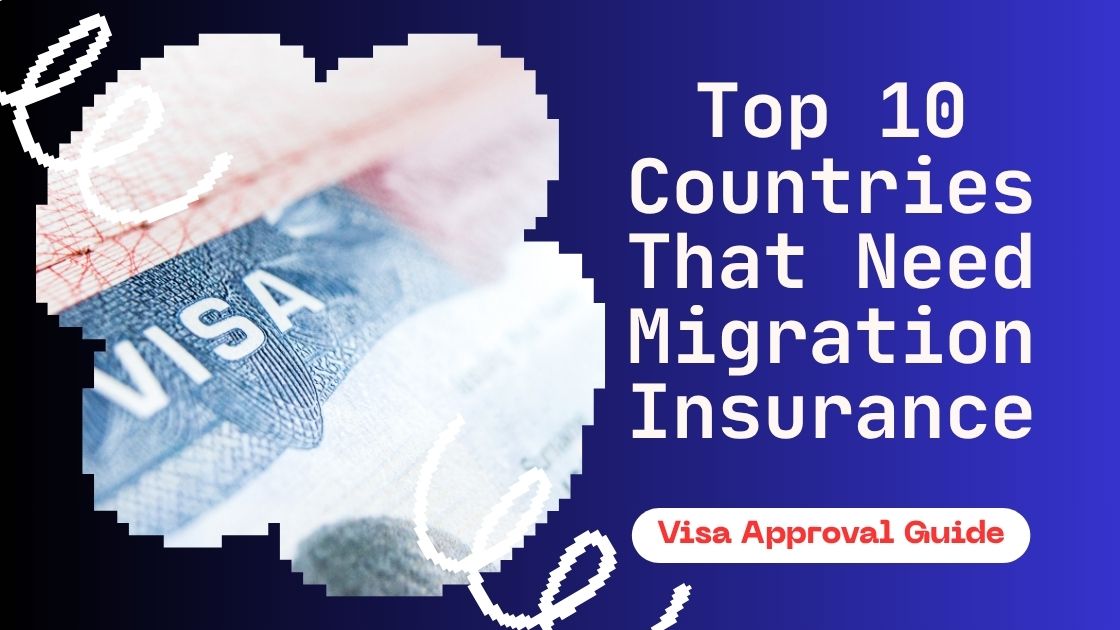You’ve mapped out your migration move, bookmarked cozy cafes in Lisbon, or even started learning German for your big Berlin dream. But just when your application feels complete… There’s that one tricky requirement: migration insurance.
Yes, it’s real. And yes, it’s often mandatory.
More countries than ever are now requiring proof of comprehensive migration insurance as a condition for long-term visas—especially digital nomad, retirement, student, and family reunification permits. In this blog, we’ll walk you through the top 10 countries that demand it, explain what counts as “acceptable coverage,” and help you avoid common pitfalls that could derail your visa approval.
Why Is Migration Insurance So Important?
When you move abroad—even temporarily—you’re stepping out of your home country’s safety net. That means:
- No access to free or subsidized health care
- Limited or zero emergency services without prepayment
- Visa denial if your insurance doesn’t meet specific government standards
HOW TO HELP ONE SELF ON ENVIROMENTAL IMPROVEMENT
Governments want to protect their health systems and ensure migrants won’t become a financial burden. That’s where migration insurance comes in—it’s your personal health-and-safety backup that ticks all the immigration boxes.

Top 10 Countries That Require Migration Insurance in 2025
1. Germany
Germany has long demanded comprehensive insurance for students, freelancers, and long-stay residents. Public health insurance is available only to employed residents. For everyone else—especially freelancers or digital nomads—you must show private health insurance with no deductible and day-one coverage.
Pro tip: Providers like Cigna Global and Ottonova are popular choices for expats applying for German residence permits.
2. Spain
Planning to live la vida nómada under Spain’s Digital Nomad Visa? You’ll need migration insurance that:
- Covers medical care, hospital stays, and repatriation
- Has zero copay/deductible
- Is valid across all Spanish regions
Avoid travel insurance—it’s rejected 9 out of 10 times.
3. Portugal
One of Europe’s most expat-friendly countries, Portugal demands migration insurance for D7 (passive income) and digital nomad visas. Your policy must:
- Provide full health coverage
- Be valid in Portugal for at least one year
- Include medical evacuation and repatriation
Human insight: Most expats opt for international policies initially, then switch to Portugal’s SNS public system after residency.
4. France
France’s long-stay visa (visa de long séjour) requires a comprehensive insurance policy that includes:
- Minimum €30,000 in medical coverage
- Repatriation of remains
- Validity for the entire visa period
France is very picky—double-check your insurance certificate includes specific wording about coverage for “séjour temporaire.”
5. Thailand
Whether applying for a retirement visa (O-A or O-X) or long-term resident visa, Thailand mandates:
- Health insurance covering $100,000+ in medical care
- Proof of COVID-19 coverage
- Thai government-approved providers (for some visa types)
Migration insurance that includes outpatient, inpatient, and emergency evacuation is key.
6. Italy
Italy’s elective residency visa and student permits demand:
- Private health insurance with emergency and hospital care
- No deductible or limitations for urgent care
- Validity for at least one year
Italy’s consulates are strict—some even ask for Italian-language insurance documents. Don’t skimp here.
7. Czech Republic
For long-term stay or freelance visas (Zivno), Czechia requires:
- Private health insurance approved by Czech law
- Unlimited coverage for medical expenses
- No cost-sharing or exclusions for pre-existing conditions
Maxima and PVZP are often accepted; others need local authorization.
8. Croatia
Digital nomads love Croatia, but their temporary stay permit requires:
- Full private health insurance
- Minimum coverage of €30,000
- Proof it’s valid in Croatia
Croatia’s immigration offices may request a notarized or Croatian-translated copy of the policy—plan ahead.
9. Mexico
While not all visas require it, Mexico’s temporary and permanent resident visas often come with a silent expectation: proof you won’t rely on their healthcare system. That means:
- Showing migration insurance with inpatient/outpatient care
- Policies issued by international providers (e.g., IMG, SafetyWing)
Some embassies have started requesting insurance proof explicitly—best not to leave it out.
10. United Arab Emirates (UAE)
All residence visas in the UAE—including work, investor, and remote work—mandate UAE-accepted health insurance with:
- Emergency services
- Hospitalization
- Optional maternity and dental coverage
Abu Dhabi and Dubai have slightly different insurance rules—check which emirate you’re applying through.
What Makes Insurance ‘Migration-Ready’?
Here’s a quick checklist before you hit “submit” on that policy:
✅ Covers your full stay duration
✅ Includes emergency medical, hospitalization, and repatriation
✅ Zero or low deductible (some countries require zero)
✅ Issued by a recognized or licensed international insurer
✅ States coverage region clearly (e.g., “valid in Spain”)
✅ Provides a letter of confirmation or certificate you can attach to your visa file
Actionable Tips for Securing the Right Policy
- Start early. Some embassies require policy confirmation before your visa appointment.
- Compare global insurers. Look for reviews from expats in your destination.
- Request a visa-specific certificate. Ask your provider to use your full name, passport number, and exact visa dates.
- Avoid travel insurance if applying for a visa. It rarely meets migration requirements.
- Bundle if possible. Some plans allow spouse or child additions at low rates.
FAQs
Q1: Can I buy migration insurance after arriving in a new country?
In most cases, no. You’ll need proof of coverage before visa approval or entry.
Q2: Is migration insurance the same as expat health insurance?
Yes and no. Expat insurance is a type of migration insurance but with broader long-term benefits like chronic care, maternity, and routine visits.
Q3: What if my visa is denied after I’ve bought the policy?
Most providers allow cancellation with a visa-denial letter. Read the refund policy before purchasing.
Q4: Does travel insurance count for student or nomad visas?
Almost never. Governments want full-coverage migration insurance, not temporary trip protection.
Q5: Can I use my country’s insurance abroad?
Usually not, unless your country has a bilateral agreement with the destination (e.g., EHIC for EU countries). Even then, private insurance may still be required.
Conclusion
Migration insurance isn’t just a visa checkbox—it’s a layer of security that protects your health, finances, and dreams. As countries tighten their visa requirements in 2025, getting the right policy is just as crucial as your flight ticket.
✅ Don’t wait until the last minute.
✅ Choose wisely based on your destination’s rules.
✅ Ask questions, compare policies, and read the fine print.
If you’ve gone through the visa maze and secured migration insurance, what helped you manage your time? A checklist? A travel agent? An app? Drop your go-to strategy in the comments and help others navigate the process smarter.
